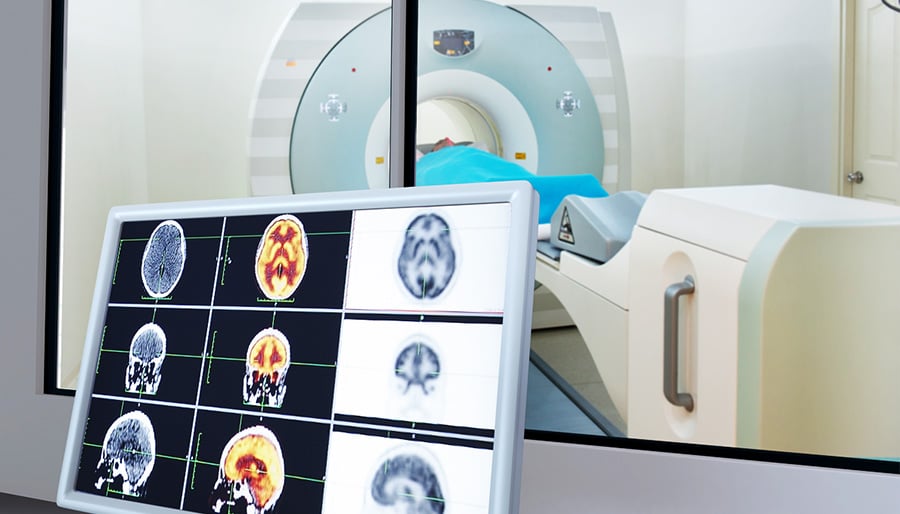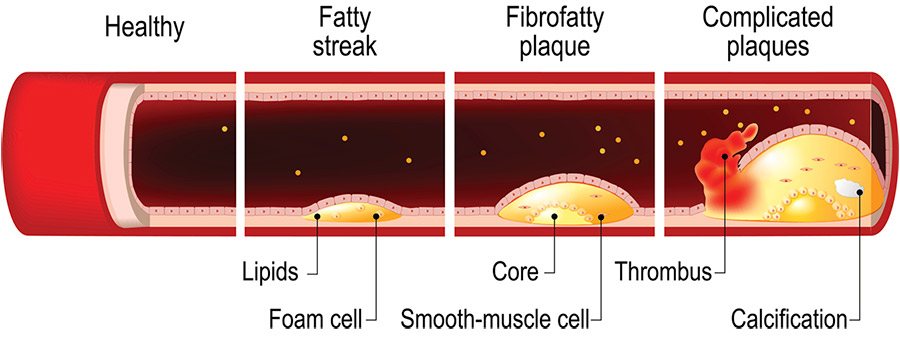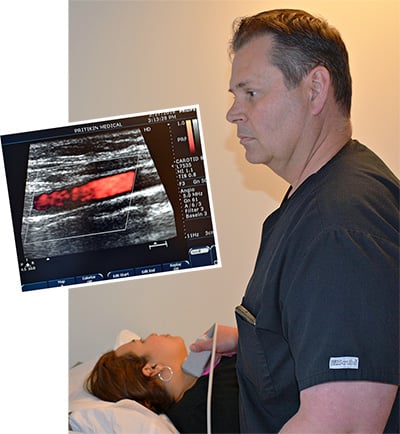“If I have a good calcium score, do I need any other testing for my heart?”
Newer, softer plaques (the ones you don’t see on CT scans) are likely more worrisome than calcified plaques. That’s because newer, softer plaques are more likely to rupture. When plaque ruptures, it triggers the formation of blood clots. It’s these blood clots that choke off blood flow to the heart, causing heart attacks.

What is a calcium score?
A calcium score is derived from a non-invasive CT scan. This scan measures the amount of calcium that may have built up in the arteries that feed your heart.
Why is calcium even in our arteries?
Think of calcium in your arteries as “old” plaque.
Plaque starts to accumulate in our arteries largely because of unhealthy lifestyle choices we’ve made, particularly years of eating a lot of foods high in saturated fat like red meat, cheese, cream, butter, and coconut oil.

When plaque first starts developing, it is soft and waxy. This is “new” plaque.
Over time, plaque hardens. Doctors often refer to this hardened plaque as calcified, or “old,” plaque.
Generally, the higher your calcium score, the more calcified plaque you have in your arteries, and the greater your risk may be of dangers like heart attacks.
Limitations of a bad calcium score
But like virtually all tests, a CT scan of the calcium in your arteries has limitations.
A high score does not necessarily mean you’re destined to have a heart attack.
But it does signal that it’s time to make heart-healthy changes to your lifestyle, like adopting the Pritikin Eating Plan or booking a vacation at a health resort like the Pritikin Longevity Center in Miami to immerse yourself in education focused on heart-healthy living.
Limitations of a good calcium score
A good calcium score does not necessarily mean your heart and arteries are in good working order.
Cardiovascular disease, especially in people younger than age 50, can be present even with a good calcium score. That’s because plaque may be there; it just hasn’t calcified yet. It’s “new” plaque.
But plaque is plaque. Calcified or un-calcified, it’s dangerous stuff.
Plaque rupture
In fact, newer, softer plaques (the ones you don’t see on CT scans) are likely more worrisome than calcified plaques. That’s because newer, softer plaques are more likely to rupture. When plaque ruptures, it triggers blood clotting (also known as a thrombus). It’s these blood clots that choke off blood flow to the heart, causing heart attacks.

At this point, you may be asking: If CT scans only measure calcified plaque, why even bother with them? They’re used by doctors because the presence of calcified plaque often means that soft plaque is also present in our arteries.
Cardiovascular Imaging + Evaluation
There are additional non-invasive tests that, in combination with a CT calcium score and a physician’s comprehensive review of risk factors like cholesterol, can provide a far more accurate assessment of the health of your heart.
A good example is the Cardiovascular Imaging + Evaluation Package that many guests at the Pritikin Longevity Center opt for during their one- or two-week retreats at the health resort. The tests and consultations are conducted by the cardiologists, internists, endocrinologists, and technicians at Pritikin.
Calcium score | The 2-minute movie preview
Think of your calcium score as watching a 2-minute preview of a movie.
Cardiovascular Imaging + Evaluation | The whole movie
The Cardiovascular Imaging + Evaluation Package is like watching the whole movie. It looks at the complete cardiac performance of your heart. It evaluates all the valves of your heart, all blood flow, how well your heart is beating, and the exact ranges of both soft and calcified plaque in a very important artery – the carotid artery. Also imaged is your entire heart muscle.
Next, one of Pritikin’s physicians takes all the information derived from the imaging tests and sits down with you to discuss these results and what they mean for your heart. Also weighed in are any lifestyle risk factors you may have.
Together, you and your Pritikin physician then create a personalized plan of nutrition, exercise, and psychological well-being, all aimed at long-lasting heart health and improvement.
Food + Fitness + Optimal Medical Testing + Education
“Bottom line, a stay at the Pritikin Longevity Center isn’t just about eating well and exercising. It isn’t just about taking off for a week or two to shed some pounds and get things like blood sugar under control,” points out Dr. Danine Fruge, MD, Medical Director at Pritikin.
“A stay at Pritikin is also about taking advantage of cutting-edge medical testing. And it’s about getting eye-opening education from our physicians and other faculty about heart health, and how lifestyle changes can influence it.
“When it comes to our hearts, knowledge is not only power, it’s life-saving.”